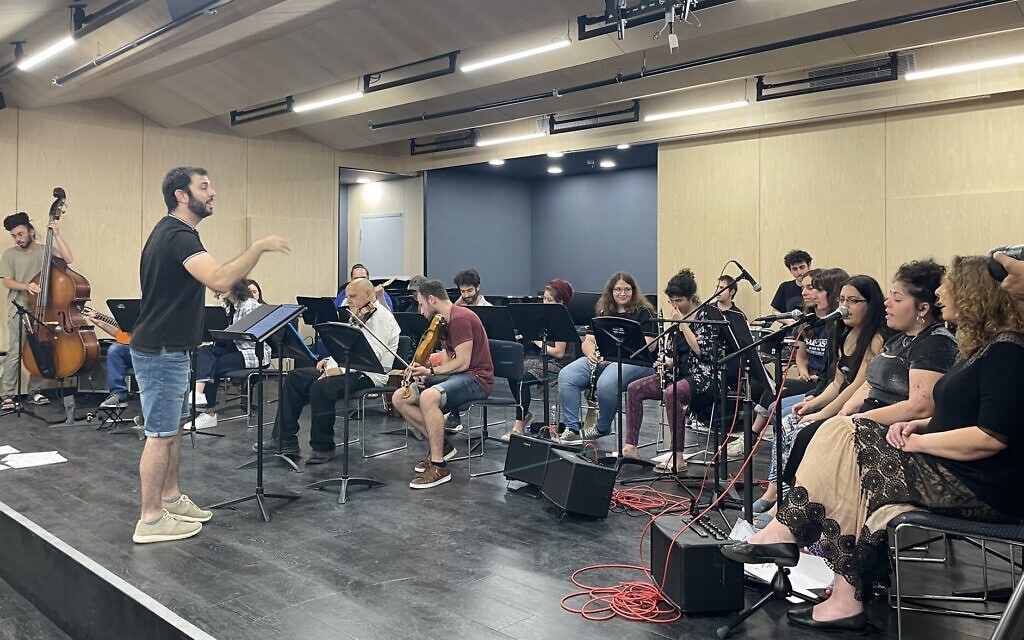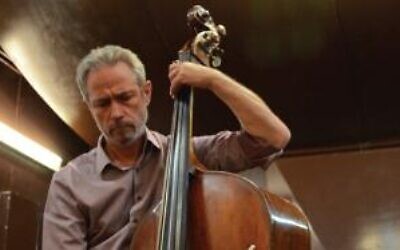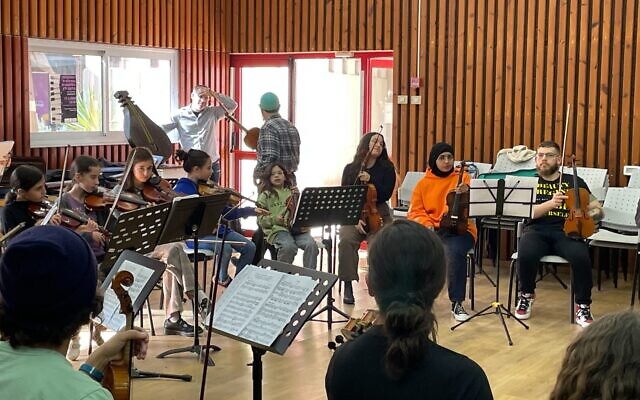Budding musicians jam in Jerusalem integrative orchestra
Conservatory president Michael Klinghoffer talks about making music meaningful, in community programs for people with special needs, the elderly and musical kids in the periphery

Making music (and dance) is at the top of the agenda at the Jerusalem Academy of Music and Dance but president Michael Klinghoffer likes to remind students that it’s a limited endeavor if you’re just in it for the money or the applause.
“If you give a concert and it’s bad, or you get a bad review, it happens, it’s over, forget it,” said Klinghoffer, a contrabass performer and professor of musical arts who has been at the academy since 1987 and was named president of the academy two years ago. “That’s not what we’re here for. We’re here to give, we’re here to be meaningful in some other person’s life.”
We were sitting at a rehearsal of the Jerusalem Integrative Orchestra, one of several community efforts that Klinghoffer established some 15 years ago with the aim of educating his students about the idea of giving.
The orchestra’s double bassist, clarinetists, two guitarists and several vocalists are Academy students, while two other guitarists, a couple of percussionists, several vocalists, a violinist and the accordion player are from Shekel, a Jerusalem organization for adults with special needs.
When a musician has the sense of giving, it changes their perspective on what is important about their artistic work, added Klinghoffer.
At this rehearsal, the 40-member orchestra was preparing for its upcoming June 13 concert at Jerusalem’s Goldstein Youth Village and had opened the session to the public in order to get used to performing in front of an audience. (The performance on June 13 is open to the public as well.)

“All in all, we’ve come to make music,” said Marko, an Academy graduate who conducts the orchestra. “It’s not therapy or education, it’s to connect to music and to people through music. It’s to connect to the soul of another person, and it’s the most efficient place to do it.”
Within the last five years, the Academy — as it’s known locally — has twice received the Council of Higher Education Award for community outreach.
That award is of major significance to Klinghoffer, who sees this kind of programming as an important opportunity to share his ideas on giving with Academy students.
It’s part of his overall educational outlook.

Klinghoffer took a zigzag route to music that began with piano lessons at home as a child, moving to electric guitar and rock in his teens then over to jazz and eventually back to classical.
While he studied at Tel Aviv’s Academy of Music, he later found himself living in Jerusalem for his wife’s career and education and has been at the Jerusalem academy ever since.
The Academy, Israel’s oldest and largest school of performing arts, has been around for 90 years and serves 800-plus students from Israel and around the world with its 12 music departments, including those catering to chamber, Arabic, opera and contemporary music.
Klinghoffer’s philosophy is for each student to find their own direction and do what grabs them. And while the Academy is located on Hebrew University’s Givat Ram campus, it’s open to everyone.
There are community programs as well, like the Jerusalem Integrative Orchestra and others for people with special needs, five music programs for kids and teens and several for the elderly, including a multigenerational choir, with a total of 80 Academy students involved overall, said Shoham Peled, an Academy graduate who directs the various community programs.

Klinghoffer travels down south about 15 times throughout each school year along with six Academy students, working with a youth orchestra that’s made up of a mix of musically inclined kids, including Jews and Arabs, secular and religious.
He noted that it’s not that easy to pull off, especially when there are rockets falling during conflicts with Gaza.
There are different kinds of conflicts and difficulties in the Integrative Orchestra, said contra bassist Shalev Ron, who’s been playing with the orchestra for the last four years, but that’s part of the challenge.
“Sometimes, you need to support them with both hands and make sure they know they’re super wanted,” said Ron. “They often want the spotlight on them, but sometimes they just won’t show up. But we’ve all learned how to communicate with each other.”

Clarinetist Tzuf Lasik wasn’t sure who was an Academy student and who was from Shekel when she first got involved; that made her pause and think differently about how to operate in this orchestra.
The Academy students don’t always know what challenges each Shekel participant faces, “and we don’t ask,” said conductor Marko.
“There are always issues and intrigues in a band,” he said. “These are things that happen, the challenges are those of musicians and we deal with music.”
Some of the Shekel participants refer to themselves as Academy students; and for some of the Academy students, playing in the orchestra is one of their greatest accomplishments.
“My life has more meaning because of this,” said Ariel, the pianist for the orchestra.
There's no paywall on The Times of Israel, but the journalism we do is costly. As an independent news organization, we are in no way influenced by political or business interests. We rely on readers like you to support our fact-based coverage of Israel and the Jewish world. If you appreciate the integrity of this type of journalism, please join the ToI Community.

We’re really pleased that you’ve read X Times of Israel articles in the past month.
That’s why we started the Times of Israel eleven years ago - to provide discerning readers like you with must-read coverage of Israel and the Jewish world.
So now we have a request. Unlike other news outlets, we haven’t put up a paywall. But as the journalism we do is costly, we invite readers for whom The Times of Israel has become important to help support our work by joining The Times of Israel Community.
For as little as $6 a month you can help support our quality journalism while enjoying The Times of Israel AD-FREE, as well as accessing exclusive content available only to Times of Israel Community members.
Thank you,
David Horovitz, Founding Editor of The Times of Israel








